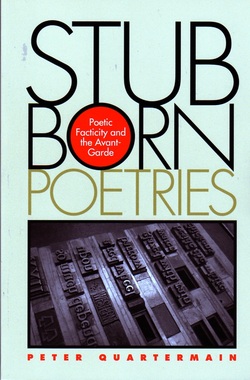
Peter Quartermain retired from teaching at the University of BC in 1999. During the preceding 36 years he had edited three editions of an American poetry anthology, published the chapbook Basil Bunting: Poet of the North, co-edited an anthology of British and Irish poetry and a collection of essays on Objectivist poetry, and in 1992 published the study Disjunctive Poetics: From Gertrude Stein and Louis Zukofsky to Susan Howe. Since then he has co-managed the small Vancouver press Nomados, edited the Collected Early Poems and Plays of Robert Duncan (2012), and presented numerous international conference papers on contemporary poetry. His edition of the Collected Later Poems and Plays of Robert Duncan is scheduled to be released later this year by the University of California Press. Many of his recent conference papers are collected here in Stubborn Poetries.
Quartermain has been interested throughout much of his career in poets whom he views as having deliberately located their work outside the canon of academically recognized poetry. He opens this collection with the essay “Canonical Strategies and the Question of Authority” in which he contrasts how T.S. Eliot, through the “cajolery and bullying” of his essay “Tradition and the Individual Talent,” presumptuously redefined the English canon to include himself with how William Carlos Williams, in his prologue to Kora in Hell, defined poetic value as “unmediated by either a set of social values or the views of the critic” (17). Quartermain thus sets up a view that pervades the collection that canonical poets tend to be the astutely self-interested while those committed more to language and poetry than to their careers tend to be non-canonical.
Quartermain has also been interested during most of his career in poetries that are not only contemptuous of canonicity but that also ‘stubbornly’ resist both paraphrase and the attribution of meaning. Several times in the
 RSS Feed
RSS Feed